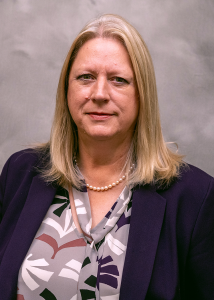Each year the College of Business recognizes its outstanding faculty with awards. This year, four new awards were created to highlight the exceptional work of this faculty and to encourage continued excellence in the areas of societal impact, research, service, innovative teaching, engaged teaching, and an individual’s impact on the college itself.

(pictured from left to right, back: Schlachter, Chen, Nelson; front: Burleson, Horpedahl, Shaw)
COB Impact Award: Steve Nelson
This new award was created to recognize faculty or staff who have outsized impact on the success of the UCA College of Business. Professor Nelson’s work outside of the classroom is most often noticed by faculty. He has served as the Director of Assessment since 2016 and revamped data collection and improvement team communications. He is an outstanding communicator who helps all faculty understand what and when to assess, which contributes to continuous improvement of the college for our students.

Societal Impact Award: Dr. Jeremy Horpedahl
Dr. Horpedahl is the incoming Director of the Arkansas Center for Research in Economics (ACRE). Outside of the classroom, he is well known in the region for sharing his expert testimony with the Arkansas Legislature as well as with the general public in the newspaper and on television. On Twitter, he helps citizens understand how to tell fact from fiction and often dispels incorrect statistics and rumors. He is also a regular contributor to Economist writing every day. This new award was created to encourage societal impact such as Dr. Horpedahl’s impact on countless students and citizens.

Innovative Teaching Award: Steve Schlachter
Professor Schlachter was recognized because of his efforts to innovate in every one of the classes he teaches, whether face-to-face or online. His work sets an excellent example as the world of higher education attempts to find ways to engage students in- and outside of the classroom.

Engaged Teaching Award: Professor Cynthia Burleson
Professor Burleson is the Director of the Center for Insurance and Risk Management (IRM). She welcomes IRM professionals on a regular basis to help students gain experience and network within the industry. Burleson’s excellent work contributes to UCA’s IRM program, which remains the only IRM program in the region, and partnerships with employers are one reason why UCA has one of the most active internship programs in the state.

Excellence in Research Award: Dr. Alex Chen
Dr. Chen is known for his excellence in research. The quality and quantity of his published works are truly excellent, but he was recognized for this award because his focus is teaching others how to research well. Dr. Chen collaborates with other faculty and students in much of his work. In this past year, four of his articles that involved student collaborations underwent review, an achievement which helps his students stand out as they pursue employment and higher education opportunities.

Excellence in Service Award: Susan Shaw
Professor Shaw serves on committees doing work that is noticed by faculty, but her work coordinating the annual IT Careers Camp in partnership with Acxiom impacts high school students around Arkansas. The event is a significant amount of work each year, and Susan does a fantastic job organizing the camp, which educates students about IT careers and encourages them to continue their education beyond high school.


